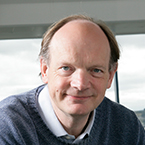
An internationally recognized cancer expert, Dr. Lane is most notable for his contributions to the discovery of the p53 tumor suppressor protein, named by him as “the guardian of the genome” and implicated in over 50 percent of all human cancers. The p53 gene represents the most commonly altered protein across all cancer types and subtypes, and as such, has been the focal point of research efforts dedicated to determining the normal functions of this gene as well as its functions related to cancer onset and progression.
The discovery of p53 occurred as a result of Dr. Lane’s early research involving the double-stranded circular DNA virus, simian virus 40 (SV40). During these studies, he was able to isolate p53 while simultaneously determining that the protein is capable of interacting with SV40’s large T antigen, known at the time to be capable of inducing malignant transformation of target cells.
Since these seminal discoveries, it has been determined that p53 possesses functionality in a variety of normal physiological processes, including angiogenesis, autophagy, DNA repair, immunity, metabolism, the cell cycle, and importantly, cell death. Dr. Lane’s ongoing studies center on exploiting p53’s ability to induce cell death. These studies include determining the mechanisms to selectively promote p53 activity as well as rescue the protein’s function when mutated. As a result of this research, Dr. Lane and others have successfully designed, developed, and characterized monoclonal antibodies, vaccines, and small molecules with clinical potential for cancer patients.
Career Highlights
2012 Lifetime Achievement Award, Cancer Research U.K.
2009 Datta Medal, Federation of European Biochemical Societies
2007 Gregor Mendel Medal, Czech Academy of Sciences
2005 Sergio Lombroso Award in Cancer Research
2004 Anthony Dipple Carcinogenesis Award, European Association for Cancer Research
2000 Knight Bachelor of the British Empire (New Year’s Honours List)
1998 Paul Ehrlich and Ludwig Darmstaedter Prize, Paul Ehrlich Foundation
1998 Elected Fellow, Academy of Medical Sciences, London
1996 Elected Fellow, The Royal Society, London
1995 Josef Steiner Cancer Research Foundation Award
1995 Meyenburg Prize
1993 Charles Rodolphe Brupacher Prize for Cancer, Zürich, Switzerland
1993 Howard Hughes International Scholar Award
1990 Elected Member, European Molecular Biology Organization
1976 PhD, University College of London